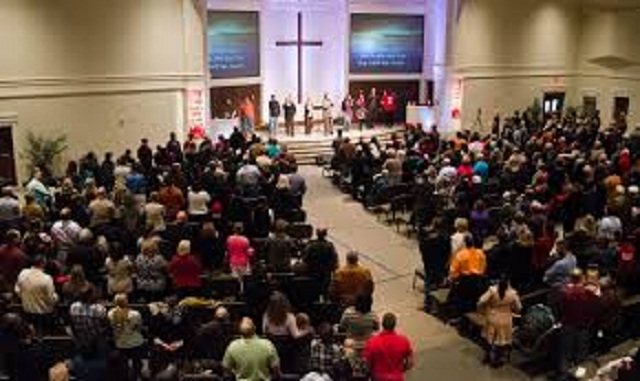
The Sunday News

Cathrine Makadzange
PENTECOSTAL churches are not new but surprisingly over the past few years they have taken Zimbabwe by storm.
So popular are the Pentecostal churches that some mainstream churches have been left with a handful of congregates.
In Bulawayo, the Pentecostal churches have occupied every space left by the closed industries and companies. The city centre is painted with colourful posters and banners of smartly dressed men and women with the captions inviting people to “come and witness miracles and receive financial breakthroughs.”
Never before were churches founded at this rate and named after pastors and prophets. Never before did churches market themselves to an extent of launching their own television and radio channels.
Some Pentecostal churches have left politicians green with envy as they attract more people than political rallies.Flamboyant business people have also been undone as rich prophets and pastors emerge. Prophets like Walter Magaya and Emmanuel Makandiwa have amassed so much wealth to the extent of being among the top 40 of the richest people in Zimbabwe.
Nust Times delved deeper into understand what makes Pentecostal churches popular. Does their rise and growth spell death of mainstream churches or it is just a passing phase?
Could this be one of the signs of the end of the world as noted in Matthew 24:11 that in end many prophets will appear and deceive many people?
Passmore Chacha, a 19-year-old Nust student from Chitungwiza in Harare was born and brought up in a Roman Catholic family but has joined Christ Embassy leaving his parents in their traditional church. For him, traditional churches are stuck in the Old Testament with its strict laws.
“People want freedom in everything starting from dress code to even the food they eat,” said Passmore, adding that the death of Jesus redeemed people from being justified by the law but now people are supposed to be justified by faith as Romans 3:28 says.
“The criteria used in traditional churches to wear a church uniform are not bearable, because it’s not everyone who has the money to wed his wife so that she can also wear a church uniform like others.
“The boring part is that when you do not have a uniform you are not allowed to sit on the front seats. Most traditional churches do not allow people to eat what they want but in new churches you eat whatever you want because Colossians 2:16-23 says so let no one judge you in food, drinks, and Sabbaths,” explained Passmore.
Miriam Sibanda (68), from Sunninghill in Bulawayo grew up in Anglican Church, but is now a member of the Prophetic Healing and Deliverance (PHD) Ministries, which was formed in 2012.
Miriam joined the Prophet Walter Magaya-led PHD Ministries because she was looking for spiritual intervention since her tenants was not paying her properly.
Her four children’s struggles to get married and lack of prophesy in Anglican Church saw her migrate to PHD Ministries where she said miracles have happened.
“The prophet will just lay hands on you, use voice anointing, or kick the air, or you can put on a wrist band and all your problems will instantly disappear, you will be free indeed from all your problems,” said Miriam.
She said in her new church miracles are happening every Sunday, the lame can walk, and the dumb can also speak instantly.
“In Anglican Church there is there is no prophesy. You can actually go there the whole life without even knowing that I have a demon, but in PhD Ministries just getting inside, the demon will not remain silent, as soon as you enter the church it will start to manifest.
“As you enter the church you will see those with demons bellowing, screaming and rolling on the ground, yelling and cursing Prophet Magaya for bringing them into light like what my youngest daughter did during the first time we visited PHD last year.
Most of the Pentecostal churches founded over the past few years are fronted by individuals.
These include the United Family International Church (Emmanuel Makandiwa), Prophetic Healing and Deliverance Ministries (Walter Magaya), Tabernacle of All Nations Church (Tafadzwa Mpala), Incredible Happenings Ministries (Paseka Mboro Motsoenengi who claimed to have visited heaven recently) and many others.
Reverend Peter Gondo, from the Apostolic Faith Mission in Zvishavane, however, said Pentecostal churches started at around 1910 like his church which celebrated 101 years this year.
“The difference is that Pentecostal churches of long ago were not owned by individuals like the ones that started in the 2000s.
The true church of God has one founder who is Jesus Christ of Nazareth who is worth to be worshipped, honoured and glorified. No one have the authority to own church.”
Melissa Ganda, (22), a Seventh Day Adventist student from Nust believes people are leaving their traditional churches to new Pentecostal churches because they want prosperity given the hard economic times which they are subjected to.
“People want to prosper, so they are going to new Pentecostal churches to be given hope by the type of gospel that is being preached every Sunday,” said Melissa.
“New Pentecostal churches preach prosperity gospel instead of the gospel that leads people to Christ.
Every Sunday they tell people to touch cars that they want, telling people that as soon as possible they will be having a car that is similar to the one that you touched instead of encouraging people to work for all the things they want in life.
“People are flocking to these new Pentecostal churches because they want to be told what they ate yesterday and to be told their phone numbers but you already know it, so what’s the use of it?”
CATHRINE MAKADZANGE is a second year student in the Department of Journalism and Media Studies at the National University of Science and Technology.



